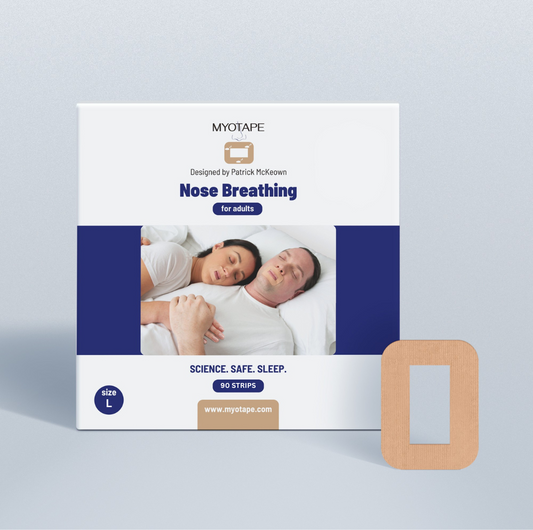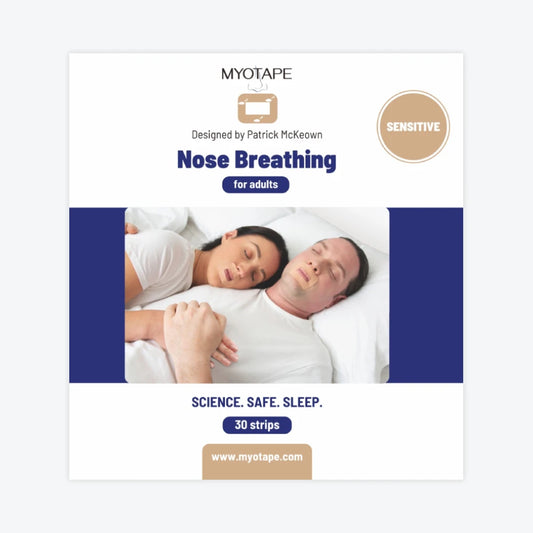The nose is a small yet remarkable organ that not only adds character to our faces but also plays a crucial role in our overall health. It performs an important function that keeps us alive — breathing.
Despite its importance, many people overlook how they breathe, often defaulting to mouth breathing without realizing it. The truth is that our noses are designed for breathing, and opting for nasal breathing has many surprising health benefits that many of us are unaware of.
Yes, breathing through your nose can improve your health in ways you might not expect. Many people breathe through their mouths, especially when they sleep or exercise, and they miss out on the good things nasal breathing offers.
In this post, you will find out the benefits of nose breathing and why you should make a conscious effort to adopt this healthier habit.
15 Important Benefits of Nose Breathing
Here are just some of the lesser-known advantages of breathing through your nose:
1. Increases oxygen uptake
Breathing, in the simplest terms, means taking in oxygen and letting out carbon dioxide. But did you know that breathing through your nose is the best way to get more oxygen into your body?
When you breathe through your nose, your body gets more oxygen than it does through mouth breathing. A study found that nasal breathing increases the oxygen in your blood by nearly 10%. This means your muscles and organs get more of the oxygen they need to work well.
The nose is designed to make breathing more effective. It filters, warms, and moistens the air, which helps your lungs absorb oxygen better. This extra oxygen can give you more energy, improve your health, and even boost your physical performance.
Switching to nasal breathing is a simple change that can make a big difference in your life. It helps your body get the oxygen it needs to function at its best, making you feel healthier and more energetic.
2. Enhances lung efficiency
Another advantage of nose breathing is that it does wonders for your lungs, making them work more efficiently and keeping them healthy.
When you breathe through your nose, you dilate the blood vessels in your lungs. This means that the blood vessels widen, allowing more blood to flow through and improving the oxygen levels in your blood. This happens because when you breathe through your nose, you inhale nitric oxide, a gas that helps to open up blood vessels in your lungs.
Another benefit of nasal breathing is the redistribution of blood throughout the lungs. The nasal passages are lined with mucus, hairs, and immune cells.
These features help trap and remove harmful particles like bacteria and viruses, preventing them from reaching your lungs when you breathe. This natural filtration system keeps your lungs cleaner and healthier.
Lastly, nasal breathing helps maintain the elasticity of your lungs. Breathing through the nose creates a slight resistance during both inhalation and exhalation. This resistance helps keep your lungs flexible and ensures they function optimally for gas exchange. In other words, it keeps your lungs in good shape, allowing them to work efficiently.
3. Increases nitric oxide production
Nitric oxide is a gas that is produced in your nasal passages and plays a crucial role in maintaining healthy lung function.
When you breathe through your nose, you inhale this nitric oxide, which helps open your airways and improve air and blood flow to your lungs. This makes your breathing more efficient and supports better overall lung health.
Research shows that nasal breathing increases the amount of nitric oxide you take in, which can help protect against certain respiratory infections.
Nitric oxide has antimicrobial properties, which can kill or stop the growth of harmful bacteria and viruses you might breathe in. This helps keep your lungs cleaner and reduces the risk of infections.
4. Gives better sleep quality

Another advantage of breathing through your nose is that it improves sleep quality and sleep latency, helping you wake up feeling refreshed and energized.
You see, when you use your nose to breathe at night, it improves the oxygen levels in your body. Studies have shown that nasal breathing during sleep allows for more oxygen uptake compared to mouth breathing.
This is especially important for people with sleep apnea, a condition where breathing repeatedly stops and starts during sleep. Proper nasal breathing can help reduce the severity of sleep apnea symptoms, leading to a more restful night.
Nasal breathing also contributes to a restful and deeper sleep. This is because it reduces snoring and the severity of obstructive sleep apnea.
With nose breathing, you are less likely to wake up with a dry mouth, a sign that you have been breathing through your mouth during sleep. Keeping your mouth moist is an important indicator of good nasal breathing and better sleep efficiency and quality.
Nose breathing is also very important for kids, as it helps children sleep better.
5. Maintains water balance
When you breathe out, the air leaving your body contains moisture from your respiratory tract. The nasal passages are lined with a mucous membrane that helps capture and recycle this moisture, reducing the amount of water lost from your body.
This process helps keep you hydrated and maintains a proper balance of water in your system.
A 2006 study found that people who breathe through their mouths lose more water compared to those who breathe through their noses.
This is because mouth breathing doesn’t have the same moisture-capturing ability as the nasal passages, leading to increased water loss.
6. Improves brain function
A good reason to breathe through your nose is because it can also enhance your brain and cognitive function, making you feel more alert and energetic.
A 2015 study involving 100 participants, half of whom had chronic rhinosinusitis (a condition causing nasal congestion), found that those with nasal congestion experienced significantly more cognitive dysfunction and fatigue. They also had slower reaction times on computerized tests, indicating that their brain function was impaired.
Thus, people with normal nasal function tend to have better cognitive performance and higher energy levels compared to those with chronic nasal issues.
Why is that? Nasal breathing helps ensure that your brain gets the optimal amount of oxygen it needs to function well. When your nasal passages are clear, you can breathe more efficiently, which supports better oxygen delivery to your brain.
This can improve your focus, memory, and overall mental clarity. Hence, nasal breathing can boost your mental health.
7. Defends the body against foreign substances
When air enters through the nasal passages, it encounters a series of natural defenses. These passages are lined with mucus, tiny hairs called cilia, and immune cells. Together, these elements trap and remove harmful particles like bacteria and viruses, preventing them from reaching your lungs.
The nasal cavity also contains enzymes and other chemical agents that can break down and destroy these harmful substances before they have a chance to enter your respiratory system.
One of the key components of this defense system is an enzyme found in nasal mucus that can break down the cell walls of bacteria, rendering them harmless. This chemical defense mechanism is a crucial part of our body’s immune system, helping to protect us from various airborne threats.
8. Improves your speech and vocals
Breathing through your nose can significantly reduce the effort required for speaking and improve your vocal quality.
If you speak or sing often while breathing through your mouth, this can irritate and inflame your vocal cords, making it harder to speak or sing clearly. However, nasal breathing naturally humidifies and filters the air, keeping your vocal cords moist and less irritated. This reduces the vocal effort needed to speak and lowers the risk of voice problems.
A study found that nasal breathing helps reduce vocal strain, leading to better voice quality. By keeping your vocal cords from drying out, nasal breathing makes it easier to talk or sing for long periods.
The nose also adds depth and richness to your voice through nasal resonance. This resonance occurs when sound waves from your vocal cords vibrate in the nasal cavity, giving your voice a unique and pleasant quality. Without it, your voice might sound flat and lack expression.
9. Improves athletic performance

Most people tend to breathe through their mouths when they exercise; nevertheless, nasal breathing is just as important while engaging in exercise and has benefits.
One major benefit is that nasal breathing helps prevent exercise-induced bronchoconstriction, a condition where airways narrow during or after exercise.
One scientific study stated breathing through the nose during physical activity greatly reduces post-exercise airway narrowing compared to mouth breathing. This benefit is relevant to everyone, whether or not they have asthma.
Nasal breathing also allows for better utilization of oxygen during exercise. By reducing the pressure of oxygen expired from the body, nasal breathing ensures that more oxygen is extracted from the lungs and blood to be used by working muscles. This makes your body more efficient at using oxygen, which can enhance your performance.
Additionally, training with nasal breathing can reduce ventilation or the volume of breathing. Initially, switching to nasal breathing during exercise might feel challenging due to a sensation of air hunger.
However, with practice, your body adapts to tolerate higher levels of carbon dioxide, which leads to reduced breathlessness and greater breathing efficiency. A 2020 study published in the International Journal of Kinesiology and Sports Science found that ventilation was reduced by 22% in individuals who practiced nasal breathing during exercise.
In fact, due to this benefit of nasal breathing, many athletes are now using mouth tapes for better sports performance.
10. Supports proper facial development
Many people don’t know this, but breathing through your nose plays a crucial role in the proper development of your facial structure, especially in children.
A study involving 47 children examined how different breathing modes, nose breathing versus mouth breathing—affected facial development. The researchers found that children who primarily breathed through their mouths were more likely to develop longer facial structures compared to those who breathed through their noses
Nasal breathing encourages proper growth and alignment of the facial bones. Breathing through your nose promotes the natural positioning and development of your jaw, teeth, and overall facial structure.
In contrast, mouth breathing can lead to changes in facial growth, such as an elongated face, misaligned teeth, and other orthodontic issues.
11. Strengthens the diaphragm
The diaphragm is a large, dome-shaped muscle that separates the chest from the abdomen. It is the primary muscle responsible for breathing.
When you breathe through your mouth, the movement of the diaphragm is reduced, leading to less effective breathing.
On the other hand, nasal breathing increases the recruitment and movement of the diaphragm, making it stronger and making your breathing more efficient and effective.
A 2015 study found that adults who breathed through their noses had better diaphragmatic movement and less reliance on accessory breathing muscles compared to those who breathed through their mouths.
This means that nasal breathing helps you use your diaphragm more effectively, which is essential for proper breathing mechanics.
12. Regulates your body temperature
An advantage of breathing through your nose is that it plays a vital role in helping your body regulate its temperature.
The nasal passages are filled with blood vessels that help manage your body’s heat. When you inhale, the air passing through your nose is warmed by these blood vessels, which helps maintain your core temperature.
This process is known as thermoregulation. It ensures that the air reaching your lungs is at an optimal temperature, which is especially important in cold environments.
In hot environments, the nose can also help prevent overheating. By increasing blood flow to the skin, the nose helps dissipate excess heat from the body, keeping you cooler.
Studies have shown that the microvascular anatomy of the nose is designed to support these functions, making nasal breathing a vital part of maintaining your body’s temperature balance.
13. Promotes better dental health
When you breathe through your mouth, it causes your mouth to become dry by reducing saliva production. Saliva is important because it helps clean your mouth, neutralize acids from bacteria, and fight off infections.
A dry mouth can lead to more cavities, gum disease, and bad breath because there’s less saliva to protect your teeth and gums.
Nasal breathing helps keep your mouth moist by promoting saliva production. This moisture protects your teeth from decay and your gums from disease. It also helps your tongue stay in the correct position, supporting proper teeth alignment and jaw development.
Mouth breathing can also affect the position of your teeth and jaw. It can cause your tongue to rest in the wrong place, leading to crooked teeth and other dental issues. This might mean needing braces or other treatments to fix your teeth.
Conversely, when you breathe with your nose, your tongue stays in the right position, supporting proper teeth alignment and jaw development.
14. Humidifies inhaled air
Another vital benefit of being a nose breather is because your nose is also essential in humidifying the air before it reaches your lungs.
One of the main functions of the nose is to add moisture to the air you breathe in. This is done through the evaporation of water from the internal surface of the nasal passages. When you breathe in moist and warm air, it helps protect your lungs from drying out and becoming inflamed.
Studies have shown that the nose can warm and humidify up to 80% of the air before it reaches the lungs.
Nasal breathing makes this process highly efficient because the blood flow in the nasal passages moves in the opposite direction to the incoming airflow, allowing for better warming and humidification of the air.
15. Boosts your sense of taste

Breathing through your nose significantly enhances your sense of taste, enriching your sensory experiences.
The nose also plays a crucial role in taste perception. It communicates with a part of the brain called the orbitofrontal cortex, which is responsible for processing taste and smell signals together.
This coupling of smell and taste allows you to fully experience flavors. When you breathe through your nose, you enhance this connection, leading to a richer and more nuanced perception of taste. Find out how to protect your sense of smell and taste.
MyoTape Will Help You Breathe Through Your Nose
As you have seen, you can get so many excellent health benefits from nose breathing. However, it is not easy to switch to nasal breathing. Thus, MyoTape is here to help train you to always breathe through your nose. MyoTape is an innovative, proven, and safe mouth tape created by world-renowned breathing expert, Patrick McKeown. It holds your lips together and trains the muscles around your mouth to keep the mouth shut. MyoTape is designed with you in mind and offers all the perks of mouth taping without the downsides.
MyoTape has a range of effective mouth taping products. Visit our online shop to view our range of mouth taping products. Available are mouth tapes for adults, mouth tape for sensitive skin, mouth tape for facial hair, and mouth tape for kids.








